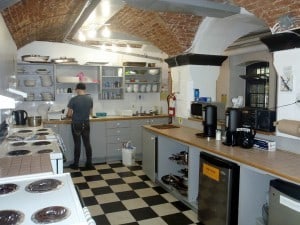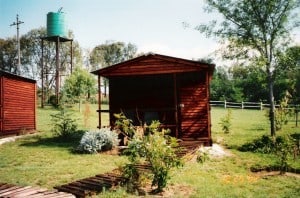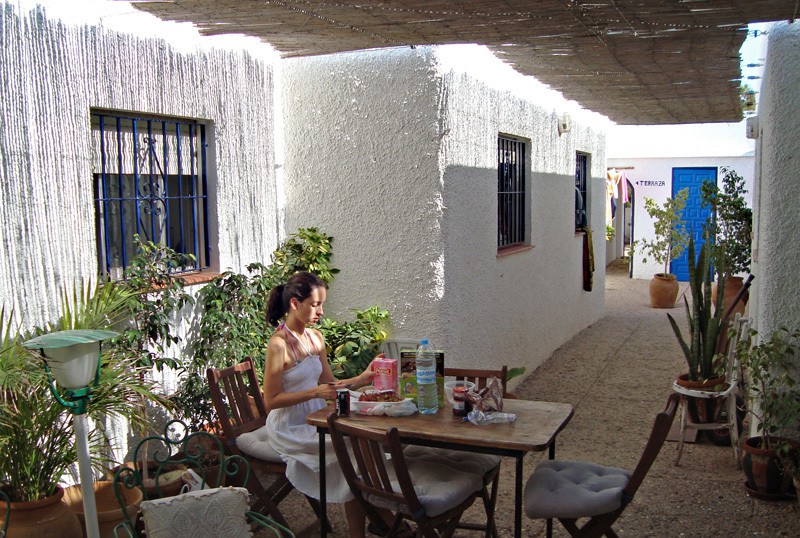In a previous post, I talked about couchsurfing as a great way to eliminate lodging costs while traveling. When couchsurfers aren’t available or I want to do my own thing without worrying about my host’s schedule, hostels are my next best resource for reducing my travel costs considerably. Hostels are wonderful places to connect with other travelers and learn some great tips for things to see and do in the area or places to visit in the future.

Many hostels have kitchens which will help you save on food costs. (Image credit: Brian)
Most hostels have kitchen areas, so you can make your own meals and save a lot of money that way, rather than eating out several times per day. Often hostels offer other amenities as well, such as computer/internet access, free breakfasts, airport shuttle service, cheap tours, and lots of information about the area. Some have pools, hot tubs, or barbeque grills. Many offer a common area full of games, books, movies, and other things to do.

Private cabin I stayed in at the Kyalami Backpacker’s Hostel in South Africa, where ostriches and a friendly pet pig wandered the property!
I love how each hostel is unique. I have stayed at lighthouses on the California coast (Pigeon Point, Montara), in a building a block from Times Square in New York, in quaint little cabins in South Africa, and in a Victorian house in Alaska. I have heard of hostels made from old jumbo jets and train cars, castles, mines, prisons, tree houses, yurts…you name it. If you like staying in really unique places, there are hostels that will fit the bill!
Hostels and guest houses have saved me thousands of dollars over the years in London, Nicaragua, Costa Rica, Hawaii, Benin, New Zealand, and from coast to coast in the United States.
Some hostels are much better than others. In most cases, I have found them clean and the guests quiet and respectful enough. Sometimes, though, I have had to endure loud parties downstairs or loud snorers in dorm rooms, and some hostels leave a lot to be desired in the cleanliness category. It helps to read reviews of each hostel before going; these give you a pretty good idea of whether the place tends to attract partiers, how friendly the staff are, how clean and safe the place is, and so on. Most hostels have several reviews on all the major hostel booking sites, like Hostelbookers.com, hostelworld.com and others.
Hostels often have several different types of accommodations. There are dorm rooms–some co-ed and some gender-specific–and often there are also private rooms. Sometimes the private rooms share a common bathroom with other rooms, and sometimes they have their own bathroom ensuite. The private hostel rooms with private bathrooms are often as nice as any basic hotel, and cheaper.

Hostel in Spain (Image credit: Jason Priem)
Prices vary widely depending on location and accommodation type, but dorm beds are always a small fraction of the price you would find for any hotel room in the same neighborhood. Staying a block from Times Square in the Broadway Theater District, for example, cost $25 for a bed at the time I stayed there (many years ago now). This was a bit on the high end for a hostel dorm bed in the U.S., but a total bargain when all of the hotels in the same neighborhood started out at well over $150 per night. I have stayed in downtown Denver for $15 per night; Costa Rica for $5 per night, and in Queenstown, New Zealand for $30 per person for a private room with a semi-private kitchenette and bathroom (shared with just one other room) and free veggie soup every evening (and the cheapest regular hotels in the area start at around $100)! For solo travelers or couples, hostels are often a much cheaper option than hotels. When you have whole families or larger groups traveling together, then sometimes it becomes cheaper to get a hotel room and split the cost.
A common myth about hostels is that they are only for young people. I have stayed all over the world and have not seen an age restriction. While they do tend to attract a younger demographic, I have seen people of all ages in hostels. In fact, hostels were first introduced to me by a couple nearing retirement age; that was 16 years ago and they are now into their 70s and still staying in hostels! While traveling through New Zealand, my husband and I regularly ran into people in their 50s and above staying in hostels. We stay in them frequently and are now well beyond our college years ourselves. Just because you may be more “mature,” don’t discount the hostels as great places to stay–especially the private rooms if you like things a bit more quiet.
Here are a few tips for a successful stay in a hostel:
- Read the reviews before making your booking to get an idea of the safety and cleanliness of the place. It may be worth an extra dollar or two extra to stay away from the absolute cheapest option which tends to attract “rougher” people and may not be as clean and well-kept.
- Pack light! This is especially important if you are going to be staying in the dorm rooms. You don’t want the hassle of stuff everywhere, and everyone else sharing the room with you will appreciate it if you don’t hog a lot of space with your luggage.
- Bring earplugs. If you’re in a dorm room you may have some roommates that like to snore.
- Don’t leave stuff laying around, especially in dorm rooms. Keep your valuable items with you or lock them up in a locker–many hostels have lockers. I’ve never had anything stolen while staying at a hostel, but I am not careless! Don’t make your stuff easy to get to or you’re just begging for it to disappear.
If you’re traveling in the high season, book ahead. In low season it’s pretty easy to walk into any hostel and find a bed or room, and this kind of flexibility is really nice. At the height of tourist season, however, availability–especially private rooms–can disappear quickly, so you might need to jump online or grab the phone and make your reservation a few days in advance.
I have a hard time spending a lot of money for a fancy hotel room where I spend most of my time unconscious. The way I see it, if I can get a good sleep, I am just as happy to lay on a dorm bed and save myself a huge bunch of money that I can then spend on something fun, like a rafting trip or a unique educational tour or just a few more days of travel than I would have otherwise been able to afford. Stay two nights in a hostel instead of a nice hotel and suddenly you can afford to do something really wild. Skydiving, anyone?

Save on sleeps; do something wild! (Image credit: Philip Leara)
Do you have any questions or comments about hostels? Any good tips to add? How about other alternatives? I’ll be discussing some other alternatives to hotels, hostels, and couchsurfers in a future post. What should I include in my write-up? Share your thoughts below!
Happy travels!



Pingback: How To: Use the Local Resources | Travel Beyond Excuse()